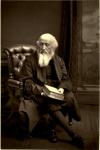Meary-Ann wer alwone wi' her beäby in eärms,
In her house wi' the trees over head,
Vor her husban' wer out in the night an' the storms,
In his business a-tweilèn vor bread;
An' she, as the wind in the elems did roar,
Did grievy vor Robert all night out o' door.
An' her kinsvo'k an' naï'bours did zay ov her chile,
(Under the high elem tree),
That a prettier never did babble or smile
Up o' top ov a proud mother's knee;
An' his mother did toss en, an' kiss en, an' call
En her darlèn, an' life, an' her hope, an' her all.
But she vound in the evenèn the chile werden well,
(Under the dark elem tree),
An' she thought she could gi'e all the worold to tell,
Vor a truth what his aïlèn mid be;
An' she thought o'en last in her praÿers at night,
An' she look'd at en last as she put out the light.
An' she vound en grow wo'se in the dead o' the night,
(Under the dark elem tree),
An' she press'd en ageän her warm bosom so tight,
An' she rock'd en so sorrowfully;
An' there laid a-nestlèn the poor little bwoy,
Till his struggles grew weak, an' his cries died awoy.
An' the moon wer a-sheenèn down into the pleäce,
(Under the dark elem tree),
An' his mother could zee that his lips an' his feäce
Wer so white as cleän axen could be;
An' her tongue wer a-tied an' her still heart did zwell,
Till her senses come back wi' the vu'st tear that vell.
Never mwore can she veel his warm feäce in her breast,
(Under the green elem tree),
Vor his eyes be a-shut, an' his hands be at rest,
An' he's now vrom his païn a-zet free;
Vor his soul, we do know, is to heaven a-vled,
Where noo païn is a-known, an' noo tears be a-shed.






